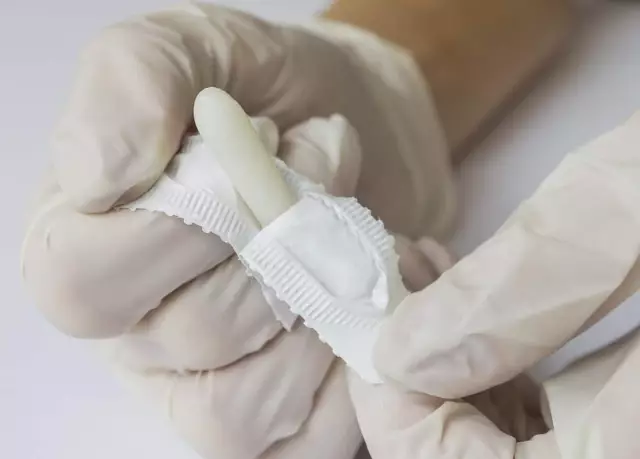- Author Rachel Wainwright wainwright@abchealthonline.com.
- Public 2024-01-15 19:51.
- Last modified 2025-11-02 20:14.
Suppositories for constipation
The content of the article:
- Indications for use
- How to use rectal suppositories correctly
- Contraindications
- Overview of the main types of laxative suppositories
- Side effects
- Suppositories for constipation for infants
- Therapy for constipation in the elderly
- Suppositories for constipation during pregnancy and lactation
- Prevention of constipation
- Video
Suppositories for constipation are relatively inexpensive, at the same time effective and safe medicines that allow you to cleanse the intestines in a short time.
Constipation - insufficient, difficult or delayed emptying (bowel movements) of the large intestine. The main signs of this condition are:
- increased dryness and stiffness of feces;
- small amount of stool;
- stool frequency less than three times a week;
- feeling of incomplete emptying of the rectum.

Bisacodyl is one of the most popular drugs for constipation in the form of rectal suppositories.
Indications for use
Rectal suppositories (suppositories) for constipation should be used only in cases when stool stagnation occurs in the terminal sections of the large intestine, namely in the sigmoid or rectum, that is, with a proctogenic reason for delayed bowel movements. If the cause of constipation lies in disturbances in the innervation of the intestinal wall, then suppositories are ineffective.
The main indications for the appointment of laxative suppositories are:
- constipation associated with weakness of the muscular apparatus of the rectum and pelvic floor;
- pregnancy;
- no stool for more than 5-7 days;
- the inability to take tablet forms of laxatives, for example, in young children;
- the need for soft bowel movements in patients with certain extraintestinal diseases (stroke, acute myocardial infarction).
How to use rectal suppositories correctly
When using suppositories against constipation, regardless of their name, it is important to follow certain rules:
- An adult is recommended to put laxative suppositories no more than once a day. It is advisable to carry out the procedure 20-30 minutes after breakfast.
- The duration of the course of treatment should be as short as possible. If you use laxative suppositories for a long period, and even more so constantly, then addiction gradually develops to them. This is due to the fact that regular irritation of the nerve receptors of the mucous membrane of the rectal ampulla over time causes a decrease in their sensitivity. If a long course of treatment is necessary, the doctor usually recommends the patient to periodically change the drug.
- If, when using suppositories, a person develops discomfort, burning or itching in the perianal region, then their further use should be abandoned and a doctor should be consulted.
In order to achieve a good and quick effect, it is important to correctly insert constipation suppositories. To do this, follow these steps:
- lie on your left side and pull your knees to your stomach;
- with your right hand, gently push the suppository through the external rectal sphincter (to facilitate administration, the tip of the suppository can be lightly lubricated with petroleum jelly);
- stay in a lying position on your side for 20-30 minutes, until a strong urge to defecate appears.
Contraindications
The list of contraindications for the use of laxative suppositories includes the following diseases and pathological conditions:
- colon neoplasms;
- anal fissures;
- intestinal bleeding;
- exacerbation of hemorrhoids;
- individual intolerance to the components of the drug;
- symptom complex of an acute abdomen;
- nonspecific ulcerative colitis;
- Crohn's disease;
- severe violations of the water and electrolyte balance;
- severe exhaustion.
Overview of the main types of laxative suppositories
Suppositories for constipation should only be used as directed by a doctor. You should not independently choose one or another of their types, based on the advice of acquaintances or friends, pharmacy workers or advertising in the media. This is due to the fact that suppositories are not only called differently, but also have a different mechanism of action. Let's consider some of the main types.
| Name | Mechanism of action, indications |
| Glycerin | The main active ingredient is glycerin. It irritates the nerve endings of the walls of the rectum, which contributes to the urge to defecate. The drug starts to work very quickly. It can be used in the elderly, children and pregnant women. Has a minimum of side effects. Also its advantage is its low price. |
| Gas generating | The main indication for their appointment is constipation associated with atony of the large intestine and a violation of the urge to empty it. The main active ingredient is sodium bicarbonate (baking soda). The fat base is usually cocoa butter. They are the main type of fast-acting laxative suppositories for constipation in the elderly. |
| Bisacodyl |
The mechanism of the laxative action is associated with the irritating effect of the drug. In addition, its components contribute to the formation of mucus, which envelops the feces and thereby facilitates their excretion. The use is contraindicated in children and pregnant women. |
| Ichthyol | The laxative effect is weak. It is mainly used in patients with hemorrhoids and anal fissures, since ichthyol has a pronounced anti-inflammatory effect. |
| Evakyu | Modern highly effective laxative suppositories, complex action. The main active ingredients are sodium bicarbonate, potassium bitartrate and polyethylene glycol. Suppositories help soften and liquefy feces, stimulate the motor function of the rectum. They empty the bowels quickly and well. |
Some supporters of traditional medicine are of the opinion that it is good to use self-prepared suppositories from laundry soap to treat constipation. In fact, this way of solving the problem of difficult bowel movements can cause serious harm to health. The fact is that any soap contains a sufficiently large amount of alkali, which can cause a chemical burn of the rectal mucosa, provoke the formation of long-term non-healing erosions and ulcers on it. It is strictly forbidden to use soap to stimulate bowel movements in young children.
Side effects
The use of laxative suppositories may be accompanied by the occurrence of side effects:
- itching in the anal area;
- diarrhea;
- melanosis of the colon;
- colitis.
With prolonged use of suppositories for constipation, the tone of the rectum decreases, due to which, in order to achieve the desired effect, patients are forced to increase the dose of the drug. This, in turn, further contributes to the atony of the large intestine, which leads to the formation of a vicious circle.
Suppositories for constipation for infants
Constipation in children of the first year of life is observed quite often, but not in all cases it requires any treatment. Usually, indications for staging a cleansing enema or using laxative suppositories are:
- no bowel movement for more than 72 hours;
- bloating;
- refusal to eat;
- violent regurgitation.
In pediatrics, glycerin suppositories are preferred. In this case, it is imperative to use suppositories intended for children (Glycelax, Glycerin 1.24 g). They contain less glycerin in their composition, and in addition, they are smaller than those intended for adults.
It is possible to use suppositories for constipation in children only as directed by a doctor. The course of treatment with them should be as short as possible so as not to cause the development of addiction.

For children, suppositories are available in a children's dosage and a reduced size
Therapy for constipation in the elderly
Elderly people have difficulty defecating quite often. The main reasons for its occurrence are:
- age-related weakening of the pelvic floor muscles;
- decreased physical activity.
To normalize bowel movements, doctors recommend to patients:
- adhere to proper nutrition (with a decrease in the content of refined foods in the diet and an increase in the amount of vegetable fiber);
- lead an active lifestyle (physical therapy and morning exercises, walks, swimming).
It is necessary to resort to the help of laxative suppositories only in exceptional cases when it is not possible to achieve stool discharge by changing the diet and increasing activity. Usually patients are prescribed bisacodyl or glycerin suppositories.
In old age, constipation can be caused by a malignant intestinal tumor. Usually, its development is accompanied by the following signs:
- unexplained weight loss;
- increased fatigue;
- general weakness;
- decreased appetite;
- the appearance of streaks of blood and mucus in the feces;
- flatulence.
When these symptoms appear, you should definitely consult a doctor and undergo the necessary examination, the use of suppositories for constipation in this case is strictly prohibited.
Suppositories for constipation during pregnancy and lactation
For pregnant and lactating women with constipation, doctors recommend the use of laxative suppositories with glycerin or ichthyol. They have a gentle and gentle effect. Candles for constipation of rapid action for pregnant women are undesirable, as they can provoke an increase in the tone of the uterus. The patient should discuss the feasibility of using a particular drug with the attending physician.
Prevention of constipation
Laxative suppositories are an auxiliary measure, not a treatment. For the prevention and treatment of difficult bowel movements, it is important to observe the following rules:
- go to the toilet as soon as the urge to empty the bowels appears;
- drink enough liquid (an adult should drink about 30 ml of water per kilogram of body weight per day);
- introduce foods rich in plant fiber (vegetables, bran) into your diet;
- Increase your level of physical activity (spinning the hoop, hiking, yoga, aerobics, swimming)
- do self-massage of the abdomen;
- give up drinking and smoking.
Don't get carried away with laxatives. With their prolonged use, intestinal atony increases, and the severity of constipation increases. This leads to a deterioration in overall health.
Video
We offer for viewing a video on the topic of the article.

Elena Minkina Doctor anesthesiologist-resuscitator About the author
Education: graduated from the Tashkent State Medical Institute, specializing in general medicine in 1991. Repeatedly passed refresher courses.
Work experience: anesthesiologist-resuscitator of the city maternity complex, resuscitator of the hemodialysis department.
Found a mistake in the text? Select it and press Ctrl + Enter.






